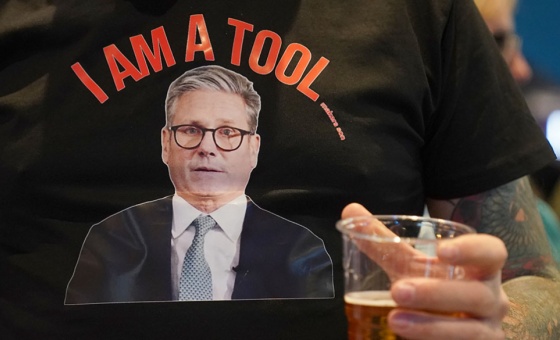This is the last article you can read this month
You can read more article this month
You can read more articles this month
Sorry your limit is up for this month
Reset on:
Please help support the Morning Star by subscribing here
HAVING made clear Labour’s voluntary enlistment in a new round of militarisation openly directed against China, David Lammy talks of its importance to the British economy and the need to co-operate with China to meet “global threats.” Lammy believes this is a “more consistent” approach than previous Tory policy toward China.
Lammy writes: “The United Kingdom’s approach to the country has oscillated wildly over the past 14 years. Former prime minister David Cameron sought to create what he called a ‘golden era’ of engagement with Beijing in 2015, which swung to overt hostility when Liz Truss became prime minister in September 2022. British policy has shifted again under prime minister Rishi Sunak, who made Cameron his foreign secretary in late 2023, into confused ambiguity.
“The United Kingdom must instead adopt a more consistent strategy, one that simultaneously challenges, competes against, and co-operates with China as appropriate. Such an approach would recognise that Beijing poses a systemic challenge for British interests and that the Chinese Communist Party poses real security threats. But it would also recognise China’s importance to the British economy. It would accept that no grouping of states can address the global threats of the climate crisis, pandemics, and artificial intelligence unless it co-operates with Beijing. There is a crucial difference between “de-risking” and decoupling, and it is in everyone’s interest that China’s relationship with the West endure and evolve.”
Taiwan
While Lammy gives no sign of a change in the formal position of the British government that Taiwan is part of China, behind the scenes shifts are occurring.
In April a Labour Party delegation led by Lord Leong visited Taiwan and met outgoing President Tsai Ing-wen, and other officials including Taipei’s foreign minister and the speaker of the Taiwanese parliament.
According to the parliamentary register of members’ interests, all flights and accommodation costs were met by the Ministry of Foreign Affairs (Mofa), Republic of China (Taiwan).
According to the Taiwanese Mofa press statement, Tsai spoke to the delegation as follows:
“I extend a very warm welcome to The [sic] Lord Leong CBE, co-chair of Labour Friends of Taiwan and shadow spokesperson for business and trade, as he leads this parliamentary delegation from the Labour Party to Taiwan. I believe this visit will enhance mutual understanding between Taiwan and the UK and promote even closer co-operation going forward.
“I would like to take this opportunity to thank the members of the delegation for establishing Labour Friends of Taiwan in March 2023. This helps strengthen UK support for Taiwan and continues to boost Taiwan-UK parliamentary exchanges.”
Lord Leong’s response is also quoted by the Mofa: “Lord Leong then delivered remarks, saying he brings greetings from the UK Labour Party. He said he is proud to address such an illustrious group of people on behalf of his delegation, especially as the Labour Party’s first ever east Asian member of the House of Lords.
“Lord Leong stated that it has been equally fascinating and inspiring to witness the energy, drive and economic success that has been delivered in the past eight years under the Democratic Progressive Party and President Tsai’s leadership. He pointed out that President Tsai has shown that political stability encourages long-term strategic thinking and investment, which is vital for economic success in a competitive and rapidly changing global climate, and that many in the Labour Party are looking at this very closely…
“Lord Leong closed by wishing Taiwan every success under President-elect Lai Ching-te, and expressed hope that he and his delegation may visit again as government ministers, rather than as shadow ministers, to continue to strengthen commercial, educational, and cultural ties between Taiwan and the UK as we learn from one another.
“Also in attendance at the meeting were House of Lords Members Lord Grantchester and [former Labour general secretary] Lord McNicol, and House of Commons Members Sharon Hodgson, Diana Johnson, Navendu Mishra and Andrew Western. The delegation was accompanied to the Presidential Office by British Office Taipei Representative John Dennis [effectively the most senior UK diplomat in Taiwan].”
If quoted correctly, Leong may be speaking out of turn regarding future ministerial visits, which would imply de facto government-government contacts. Leong did go on to say that he “acknowledges China’s position as far as Taiwan is concerned.” This is evasive language common among US State Department officials.
However, the established British position since 1972 has been that: “the government of the United Kingdom acknowledge the position of the Chinese government that Taiwan is a province of the People’s Republic of China. Both the government of the People's Republic of China and Taipei maintain that Taiwan is a part of China. We held the view both at Cairo and at Potsdam that Taiwan should be restored to China. That view has not changed. We think that the Taiwan question is China’s internal affair to be settled by the Chinese people themselves.”
The danger is that a current or future British government will abandon these “One China” positions and lean toward the “One China, One Taiwan” policy that is gaining ground in Washington. The emergence of a generously funded Taiwan lobby within the Labour Party and at an all-party level needs to be further exposed.
Hong Kong
Labour’s position on China generally and Hong Kong in particular has been to try to outflank the Tories from the right. China is alleged to be interfering in British politics, which is unacceptable, while the Tories were accused of weakening “British influence” over the former colony.
The Tories were charged with failing to properly protect British “national security interests,” while China is condemned for protecting its own security, by extending its national security legislation to cover the Hong Kong Special Administrative Region.
In a parliamentary question on March 20 2024, Lammy asked a proxy question to his opposite number Lord Cameron: “And in his constant absence, can I ask the minister whether the Foreign Secretary accepts that his golden era with China was a strategic mistake… which undermined British influence over Hong Kong, set us on a rodeo of inconsistency towards China, and failed to stand up for the UK’s national security interests. And whether we can really expect him to deliver the strong, clear-eyed and consistent approach that is needed?”
Conclusion
Labour’s “progressive realism” highlights that while the world has indeed changed dramatically, Labour’s pro-Washington and pro-Nato policies have not. It is currently unclear how the Labour leadership would navigate a possible second Trump presidency.
This could expose Keir Starmer’s and Lammy’s instinctive dependence on guidance from Washington to an administration whose erratic policies on Korea, Taiwan and Nato can only be guessed at for now.
Whoever enters the White House, the cosmetic modifications on offer from Starmer and Lammy commit Britain to a dangerous path in the Asia-Pacific, particularly the under-the-radar military agreements with Japan, South Korea and the Philippines. The left needs to ensure that the arguments against “progressive realism” reach deep into the labour and peace movements.











